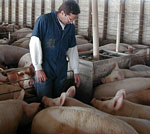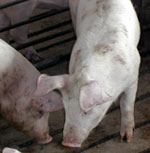Raising Safer Pork
By Tim Post
March 16, 2001
|
|
RealAudio |
The Minnesota Department of Agriculture wants to tighten the connection between the state's farmers and consumers who buy their products. The Ag Department hopes a new certification program will give consumers detailed information about their food, so they can feel secure in its quality. As Europeans deal with livestock diseases, U.S. consumers are growing more interested in where their food comes from, and how it's raised. But not everyone thinks the new effort is a good use of resources. Some say programs that help organic farmers are being cut to help the state's big farms.
| |
|
|
|
||
This 'clean barn' is just one change in farm practices here, designed to protect these pigs from disease. Animal waste flows through slatted floors. Their feed travels through sealed pipes to automatic feeders so it's never exposed to the air. Every effort is made to keep stray cats and birds out of the barn. It turns out cats can transmit diseases among pigs, and bird droppings are a real problem if they end up in feed.
"Every opening is screened so no animal of any kind can possiblly get into these pigs," says Starner. "These pigs aren't exposed to anything on the outside, either. It's an isolated environment for them, that is very clean. There are no pathogens in here for them to pick up," says Starner.
Starner is making these efforts in part because he belongs to a group called Minnesota Certified Pork. The five hog farmers in the group are reducing their animals' exposure to pathogens like E. coli, and limiting the use of antibiotics, to provide a "premium" pork product to consumers.
STATE WILL TRY CERTIFYING FARM PRODUCTS
This effort is also a pilot project for a state program call MINNCERT. The state Deparment of Agriculture will give products from a participating farm a certification stamp, if an inspection proves that farm is doing what it claims.
MINNCERT is getting its start with these five large hog farms. Paul Strandburg with the Ag department says the plan is for the program to expand its reach to any farm, large or small.
"Say someone wants free range chickens. You can't test a chicken and say, 'that's a free range chicken.' What you have to do is look at the process of raising those chickens. If they are raised outside, we will provide a certification that says here are the production methods they are promising," says Strandberg.
Strandburg says in the future, MINNCERT may help consumers track a product back to its source. For instance, a package of pork chops could carry a label with an Internet address. Consumers could call up a Web page that has details of how the pork was raised, and even pictures of the farm it came from. Minnesota Certified Pork producers should have meat in Twin Cities grocery stores in April.
| |
|
|
|
||
Some critics say funding for MINNCERT will take money away from other programs that help the state's organic farmers.
"Cutting one for the other is not an acceptable alternative," says Mike McMahon, an organizer with the Land Stewardship Project in Minneapolis.
McMahon's group promotes sustainable agriculture. He says the Department of Agriculture is shifting money to the MINNCERT project, at the expense of programs that support sustainable agriculture. McMahon says the certification program is a weak attempt since farmers set the standards themselves.
"It doesn't seem to clarify a whole lot. If the standards vary widely, it still takes consumers some close reading. They may not be getting the information they need simply through the Minnesota Certification label," says McMahon.
McMahon claims the MINNCERT program is a way to market products coming from the state's "big" farms, into the hot organic market. Agriculture officials say they want to promote any farm, large or small, that provides a quality product.
Standing among hundreds of noisy hogs, Dave Starner agrees the MINNCERT program is a marketing tool of sorts, a way for Minnesota farms to gain some recognition for what they do.
"We make so many assumptions here on the farm that, 'the people in Minneapolis know how well I take of everything, that I'm not harming the environment, and that I do the best I can to raise these pigs.' No, they don't necessarily know that. So we need to tell our story," says Starner.
Gov. Ventura has approved a proposal to fund MINNCERT as a permanent program within the state Agriculture Department, and legislators will vote on the proposal this session. State ag officials hope the MINNCERT program is ready to give a stamp of approval to Minnesota farm products by this summer.
More information:
Australian Meat Safety
Australian sheep and beef producers have a tracking and labeling system in place.
The Land Stewardship Project
Information on sustainable agriculture.
Tim Post covers central Minnesota for Minnesota Public Radio's Mainstreet unit. Reach him via e-mail at tpost@mpr.org.


